Previously on Baxter Building: Surprise! You thought that we brought this to an end two and a half years ago, but no! Baxter Building is back — for one episode only!
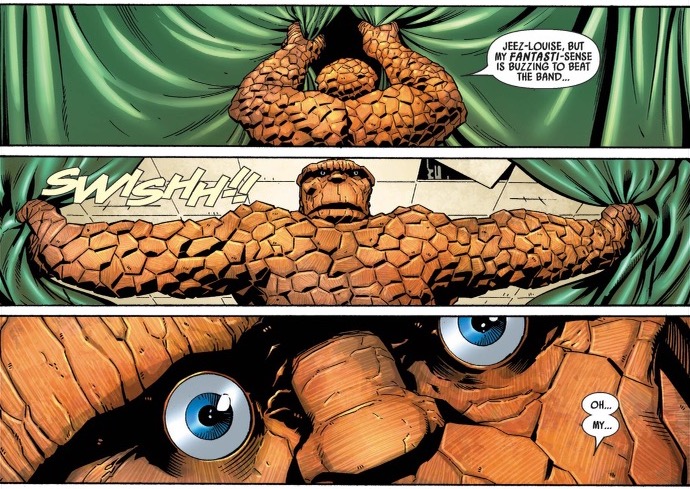
0:00:00-0:03:11: We introduce this episode, and the context behind it; basically, we’re a surprise installment of Shelfdust’s Secritic Invasion summer crossover, where Marvel’s 2008 event is re-examined from today’s hopefully more enlightened perspective. What that means for us in particular is that we’re reading and talking about Secret Invasion: Fantastic Four, a three-issue tie-in that sees the return of a beloved character from the old Baxter Building days. Well, “beloved” might be a little too strong, perhaps…
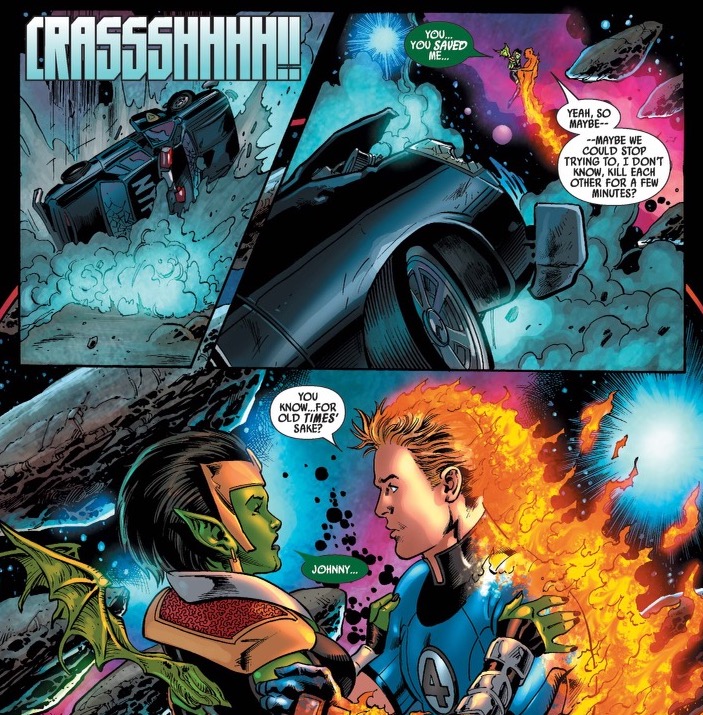
0:03:12-0:15:16: Before we get to the miniseries, we talk a little about Baxter Building and how it compares to Drokk! — as well as how Dredd fared post Wagner/Grant split, compared with how the Fantastic Four handled the Lee/Kirby break-up. (The latter has “car crash energy,” according to Jeff.) We also talk about how much we miss the Fantastic Four, and how both of us feel about the current Dan Scott run, kind of. (Well, I do, at least.)
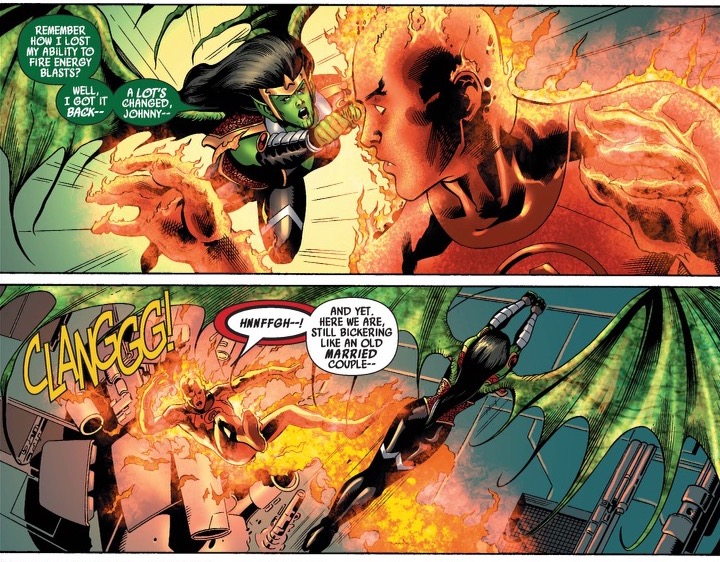
0:15:17-0:23:59: Still playing for time, we talk about Secret Invasion as a wider event, and how poorly it reads today. (Not that it read that well the first time around, arguably.) Of note, we touch on the event’s implicit bigotry, and I refer to Ritesh Babu’s essay on Shelfdust, even if I couldn’t remember his last name at the time; go read the piece, it’s a good one.
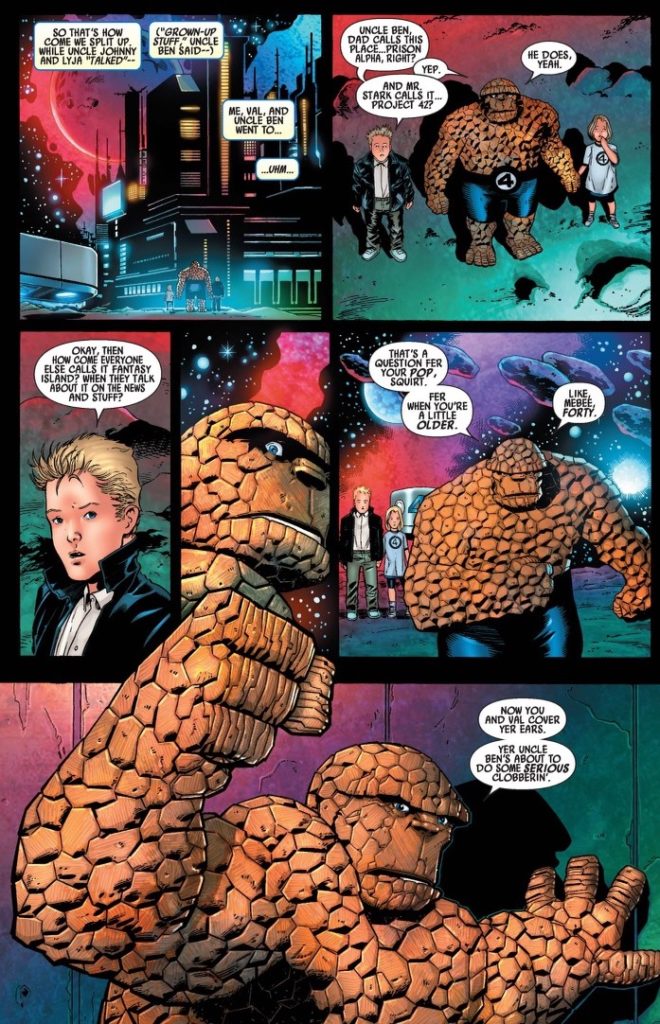
0:24:00-0:58:29: We finally get to the heart of the matter, and talk about the actual Secret Invasion: Fantastic Four series — and just how bad it actually is. This means that we talk about the (many) failures in Roberto Aguirre-Sacasa’s writing, and how it compares to the Archie work that arguably made his name, as well as how poorly paced and oddly tension-resistant this series is in particular. Also under discussion: the Negative Zone prison left over from Civil War; how no-one can write convincing children, and why that might not even be possible when it comes to Franklin and Valeria Richards anymore; and the ways in which this series does and doesn’t connect to the core Secret Invasion comic.
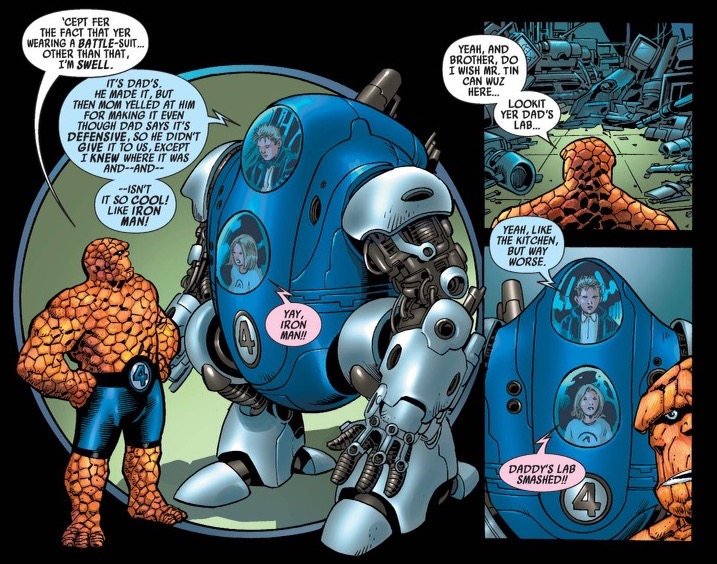
0:58:30-1:01:17: Jeff makes a brief case for Bendis’ Secret Invasion inspiring the 2012 Avengers movie, but I’m not buying it.

1:01:18-1:11:11: It’s not just Aguirre-Sacasa who disappoints here; Barry Kitson is the penciller, and we talk about how unexciting his work here is, as well as how many people are inking that work, and the fact that it seems as if no-one involved in this series really seems to want to be making it.
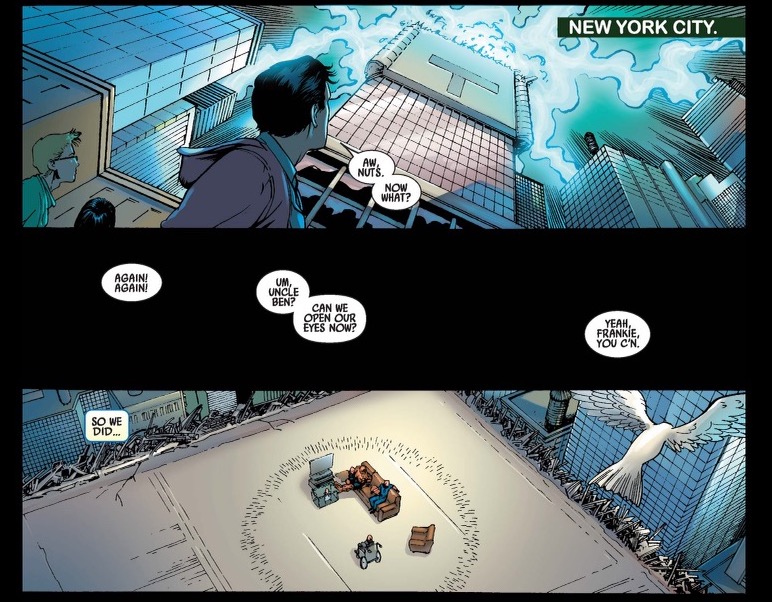
1:11:12-end: As we wrap things up, we ask ourselves the important questions: Did this one three-issue series kill our nostalgia for both Baxter Building and the Fantastic Four? How does nostalgia stand up to a re-read, anyway? And did Pixar’s The Incredibles destroy the Fantastic Four as-was, and create something else in its wake? You know, just a couple of small things. We also discuss Jeff’s health, as well as mention the Patreon, Instagram, and Twitter accounts, as is our wont. We’ll back back next week for a regular Wait, What?, and you’ll be happy to know that Drokk! is back next month as usual, too. Until then: thanks for reading and listening.


If you’re looking for the direct link, then here! Enjoy: https://theworkingdraft.com/media/podcasts4/BaxterBuildingEp51.mp3
First, I would like to say that spending an hour and a half talking about three issues is, as the kids like to say, very on brand.
Second, I got a free month of Comixology Unlimited for this month and have spent way too much time rereading the Marvel events from this time, including Secret Invasion and Civil War. So, to answer a dumb question, the Negative Zone prison did have a two way portal but Cap’s team attempted a prison break at the end of Civil War and the portal was permanently closed.
Third, one of the amazing things about the events from Civil War to Avengers vs X-Men is how consistently and, way too often, aggressively dumb the comics are. It’s kind of amazing that that seems to be one of the through lines across all of these comics. Jeff’s comment that Bendis is like a crypto-conservative or something got thinking about the connection between those two things. In Millar’s Wolverine run with Romita Jr. Reed Richards invents a terraforming machine and Tony Stark and Hank Pym are talking about colonizing Mars and whatnot but Reed mentions doing things like terraforming Africa and, you know, making the world a better place but then in Civil War the three of them are running Negative Zone Gitmo. One of the conceits of Marvel Comics is it is the world outside of your window so the comics really can’t address the massive kinds of changes that super heroes existing would cause, which is fine when you are writing primarily for kids and, of course, there is a kind of basic good and evil mortality that is mostly fine for those kind of simple stories where saving the day means preserving the status quo. Then, starting with Civil War, they really lean into the whole world outside your window but with added “relevance” by trying to tie the comics into real world concerns but they keep the same moral assumptions from before so trying to change the statue quo is automatically associated with being bad and bad guys now do things like Gitmo or be religious fanatics. Iron Man is objectively correct in Civil War but, since he is trying to change the status quo, is presented as the villain. In AvX, one of the things that the comic presents as the Phoenix-powered X-Men having gone too far is like, making the world a better place by trying to feed everyone. The X-Men, of course, also brought part of Hell to Earth and created a Hell prison in a volcano to just really let you know they are the bad guys. If you reread Bendis’ early New Avengers run it pretty obvious that it while it was setting up something bigger down the line but not Secret Invasion. It feels like the plan was changed after the success of Civil War and the only real “ripped from the headlines” subject that Marvel could come up with is “religious extremists who hate America,” given that the ’08 economic crash and disillusionment with the American Dream hadn’t happened yet, and no real thought was given to it beyond making them Skrulls. This lack of thought seems really consistent across most of these comics and they writers are trying to stay in the established bounds of the comics they read as kids and can’t incorporate the real world references without it coming off as, at best, not particularly well thought out and usually just being really dumb. I feel like this whole dynamic has effected the writing of most of Marvel’s main writers at the time would be curious about Jeff’s, or Graeme’s, thoughts on that.
My nostalgia for the Fantastic Four mostly gets an outlet in revisiting the Lee/Kirby stuff. I do try bits here and there and an odd thing becomes a story I’ll go back to- Claremont and Ladronn’s FF Annual’99 is an example, but that’s practically forever ago in comicbook terms.
I don’t recall much about Secret Wars- there was an issue of an Avengers comic, drawn by Romita, which annoyed me as it appeared to be Bendis explaining how cleverly he’d laid clues, etc. I think I liked how The Incredible Hercules comic handled the crossover, a nice example of the crossover swerve where you remove your characters from the main stage of the nonsense while paying lip-service to the banner. I might re-read those and head on into Chaos War to read those Kaluta drawn pages again. I am more likely to read the articles on Shelfdust than the rest of Secret Invasion.
I did enjoy the repeated use of Phantom Zone for the Negative Zone. So apt.
Well, mind blown. It never crossed my pretty little head that anyone put enough thought into Secret Invasion to make it an allegory. All those ads with Fifties-style families, one of whom was a Skrull… I just thought they were a take on Cold War sci-fi movies, but I can see how the ‘fear of the Other’ bit could translate after 9/11. I wonder if others living outside the US were as clueless as me.
Enjoyed the retro visit to the Baxter Building. I have listened to your visits with Judge Dredd sporadically but I am not invested in it as I was with your FF read through. I did have a question that popped up into my head when you were discussing the mini series and your revisit to the FF. After your read through with FF, Does the FF deserve the World’s Greatest Comics Magazine title and if it doesn’t what title does?
My FF nostalgia is kind of dumb. I read a bunch of translated FF in my teens, mostly Byrne which was what was published at the time with the occasional second hand older stuff. So then I re-read the Byrne run as part of Baxter Building and didn’t like it all, but I still have a fondness for the characters after the foundation crumbled.
Anyway, I’d love for Johnny and Lyja to be an ongoing thing. She’s been around in Slot’s run so I have some hope, though last we saw her secret-super-villain Alicia used the puppet master clay to make her run off.
Talk about a secret invasion! I thought my iTunes was broken trying to download a new Baxter Building for me. As Eric said, and hour and a half focused on three issues is *very* on brand for you.
Something I enjoyed about this episode, that you didn’t always have time for in the original Baxter Building, was the deep dive into the publishing context in which these issues entered the world. I think that’s something you definitely go out of your way to do in Drok, especially for the benefit of non-U.K. listeners, and it’s something I always welcome. I think it was even more germane in this episode with these three issues being a spinoff from a larger crossover event. I think some of your speculations about those conditions naturally weight themselves to sounding factual because of the hindsight of everything that’s happened in comics since these issues were published. I found that kind of extrapolation fascinating.
I never made the connection with Islamaphobia when I originally read Secret Invasion because 1) I never thought Bendis to be that conscious of metaphor, and 2) I know there’s a gap in my Marvel Comics knowledge, but missed where the Skrulls became religious fanatics. I attributed it more to him try to squeeze more storytelling blood from a well squeezed stone by finding some heretofore unused pretext for the Skrulls trying to invade Earth yet again. I mean, it’s hard to miss it now. I think that Ritesh Babu essay you linked to summarized Bendis’ approach rather well: “thoughtless and rarely considered.”
Anway, I think Eric’s exegesis of the problems with Marvel’s big events starting with Civil War was right on the nose. I think if you’re trying to tell stories like that, you’d be better served with Marvel or DC analogues, like Watchmen did.
My attempt to address Tim’s question is that there’s no good reason to apply the title World’s Greatest Comic’s Magazine to any comic, apart from Lee’s: self-serving promotion. I love Kirby and Lee’s Fantastic Four and it’s possible you could draft a set of criteria where it would qualify for that title for a lot of the 60s, but I’d need a greater knowledge of all comics around the world to set those rules narrowly enough. By the time Kirby is doing his Fourth World work those criteria need to have things like: Must include characters called Reed, Sue, Johnny and Ben. For me anyway. Again, part of the difficulty- greatest comics for who?
It’s presence on the covers now is nostalgic. It has a sense of my innocence and gullibility coded in it: ‘Remember when you thought that meant something?’ I tried some of the Slott run, but didn’t stick with it. The bit I remember is the story with Sue feeling guilty for manipulating Ben and us seeing sexy astronaut Ben Grimm. That was with Mike Allred, so it’s reasonable to suppose he may have brought more than drawing to the tale.
I really enjoyed the dip back into things FF! Particularly, I was glad to hear you talk about I miniseries I was very familiar with. I once thought I’d start a project where I read through each creator on Marvel Unlimited in alphabetical order, and the whole thing fell apart seven entries in when I dashed myself on the rocky shores of Aguirre-Sacasa’s Marvel output. It’s a pretty fascinating body of work,. but pretty much only because of his Riverdale success–he was clearly and constantly trying to explore the same themes in Marvel comics, but very rarely to particular success. Basically, he liked writing about body horror, and he liked writing about relationship drama, and neither particularly worked for the FF. (Sue got a job as a teacher pretty much solely so the students could hoot when Namor paid a visit; there’s an incredibly bizarre scene where Alicia considers letting her stepfather murder Sue so he can harvest Sue’s eyeballs for her.) It works best when he’s writing about teens or paired with a really excellent artist–I’d actually recommend the Angel and Loki miniseries. On the other hand, under no circumstances read his Marvel Divas series, unless Black Cat, Firestar, Photon and Hellcat doing a Sex in the City impression really sounds appealing.
@PersonofCon
First, reading the oeuvre of creators by name is a hell of an undertaking. I’d be into reading your notes on that, especially if it turns up some hidden gems. Your observation that Aguirre-Sacasa “liked writing about body horror, and he liked writing about relationship drama, and neither particularly worked” for the FF is interesting, as body horror and relationship drama should be perfect for the FF, what with the various love triangles, Ben Grim’s hatred of his physicality and Mr. Fantastic’s indifference to his own, etc. Talk about something that works in theory but not in practice. Maybe he needed something to work against? In Archie, plots turn on cozy relationship drama and mundane bodily discomforts: Archie is stressed that two traditionally attractive cis-het women want him to buy them a milkshake on the same day. Meanwhile, Betty and Veronica are worried about their hair. With the FF, the neurosis is dialed up to begin with, which makes subversion difficult unless you’re willing to do a full Cronenberg.